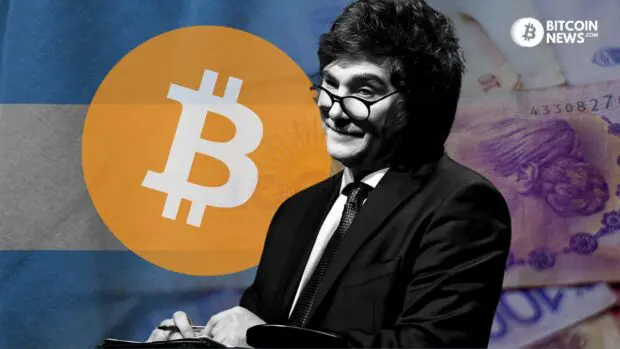Javier Milei, the new president-elect of Argentina, triumphed in the latest presidential elections thanks to his libertarian beliefs and faith in the doctrine of Austrian Economics. Argentina is in a state of rampant inflation, which has reached a staggering 142.7%, according to the Instituto Nacional de Estadística y Censos.
His electoral success also came as a result of his Bitcoin sentiments. The Argentina Bitcoin adoption possibility comes amid Argentine peso reaching an all-time high against Bitcoin.
Milei is a proponent of free markets and limited government intervention, and he has called for the elimination of Argentina’s Central Bank.
In the face of economic instability, Argentinians are increasingly turning to digital assets as a way to transact more easily and protect their savings. Bitcoin and, in particular, USDT has gained popularity as hedges against inflation and a more stable alternative to the Argentinian peso.
Milei has expressed mixed views on Bitcoin, but he has acknowledged its potential as a tool for financial freedom.
Dollarization and the Informal Market
Milei has indicated that he is inclined to dollarize Argentina’s economy. Dollarization would involve replacing the Argentine peso with the U.S. dollar as the country’s official currency. Milei believes this would help stabilize the economy and reduce inflation.
However, dollarization would also require a large injection of U.S. dollars into the Argentine economy. This could be difficult to achieve, as Argentina is a sovereign nation and cannot simply print U.S. dollars.
In the meantime, Argentinians are relying on an informal market to exchange pesos for U.S. dollars. This market is known as the “Dólar Blue,” and it operates outside of the official banking system. The Dólar Blue rate is typically higher than the official exchange rate, but it is often the only way for Argentinians to get access to U.S. dollars.
“You can walk up to any Argentinian person and ask how many pesos to a dollar, and they’ll know,” says Head of Compliance & AML at Argentina-based digital asset exchange Lemon Cash, Martel Seward.
This demonstrates how the U.S. dollar is already part of everyday life in Argentina, as Argentinians hold approximately $200 billion in bills, about 10% of the total USD cash in circulation.
Argentina Bitcoin and Digital Asset Adoption
Argentina is one of the most active digital asset markets in the world, ranking second in Latin America and fifteenth globally, according to a report by Chainalysis.
This is due in part to the country’s rampant inflation and the easy access to digital assets. Stablecoins, such as Tether, are particularly popular in Argentina, as they offer a more stable alternative to the Argentine peso.
The use of digital assets in Argentina is likely to continue to grow in the years to come, as the country grapples with economic uncertainty. Bitcoin and stablecoins offer Argentinians a way to protect their savings, make payments, and send money abroad.

Milei and Bitcoin
In a 2022 press conference, Milei talked about Bitcoin as a currency with the fundamental problem of not having the “curso forzoso”, or legal tender status, showing what has appeared to many as fundamental lack of understanding of the orange coin and its path to adoption.
CEO of Jan3 and advisor to El Salvador president Nayib Bukele, Samson Mow, has declared he’s planning to meet with Argentina’s new president to talk about how to best integrate Bitcoin in the Argentinian economy.
Earlier in November he said “Q1 next year makes more sense,” and “I have my people in touch with him.”. It seems like the conversation is moving in the right direction.
Mow added:
“Milei’s priority should be to stabilize inflation, moving towards dollarization and ultimately shutting down the Central Bank. Once they address those issues, we can work on how to integrate #Bitcoin into their national strategy.”
Given the already widespread adoption of digital assets and dollars in Argentina, there seems to be good conditions for the plan outlined by Samson Mow to prove feasible. Stablecoins pegged to the U.S. dollar could facilitate the process of dollarization of the Argentine economy, a fundamental step to stabilize the economy and allow the President to carry out the real shock therapy to solve the inflation problem: the adoption of bitcoin as legal tender.










